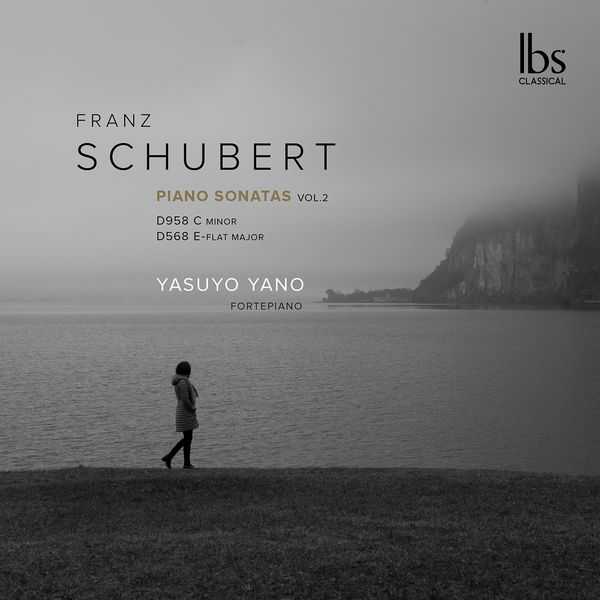

Composer: Franz Peter Schubert
Performer: Yasuyo Yano
Format: FLAC (tracks)
Label: IBS Classical
Catalogue: IBS42022
Release: 2022
Size: 583 MB
Recovery: +3%
Scan: yes
Piano Sonata No. 19 in C minor, D958
01. I. Allegro
02. II. Adagio
03. III. Menuetto. Allegro
04. IV. Allegro
Piano Sonata No. 8 in E flat major, D568
05. I. Allegro moderato
06. II. Andante molto
07. III. Menuetto. Allegretto
08. IV. Allegro moderato
Second volume of Franz Schubert’s Sonatas for Fortepiano in which Yasuyo Yano chooses two of the greatest sonatas: No. 19 in C Minor and No. 7 in E-flat Major. The Sonata in C minor, D. 958 is characteristic of Schubert’s feeling of retreat. Towards the end, the movement rushes ever more quietly towards silence, before two brute final chords conclude this grandiose sonata. The Sonata in E-flat major, D. 568, begins with a thoughtfully cautious Unisono. This rapturous mood is soon interrupted by a brisk transition, only to culminate in a swaying waltz-sweetness composed with supple chromaticism. The themes and their lively interplay always reveal a melancholy mood.
In addition to the interpretive values of the great fortepianist Yasuyo Yano, listening the Schubert’s fortepiano sonatas on an original instrument, always has enormous added value. Second volume of Franz Schubert’s “Sonatas for fortepiano” in which Yasuyo Yano chooses two of the greatest sonatas: No. 19 in C Minor and No. 7 in E-flat Major. The Sonata in C minor, D. 958 is characteristic of Schubert’s feeling of retreat. Towards the end, the movement rushes ever more quietly towards silence, before two brute final chords conclude this grandiose sonata. The Sonata in E-flat major, D. 568, begins with a thoughtfully cautious Unsiono. This rapturous mood is soon interrupted by a brisk transition, only to culminate in a swaying waltz-sweetness composed with supple chromaticism. The themes and their lively interplay always reveal a melancholy mood.
It can be speculated whether Franz Schubert, with the furious beginning of the Sonata in C minor, D. 958, composed in 1828, attempted to stand up compositionally against Ludwig van Beethoven, who was regarded as superior, to make a defiant “I can do that too” confession, as it were. This view is sometimes reinforced by the fact that Schubert might have felt liberated by Beethoven’s death in 1827 and would finally have been able to step out of his shadow. Certainly, however, this interpretation does not do Schubert justice when one considers that many of Schubert’s very great works were composed before then – e.g. he composed the “Trout Quintet” D. 667 in 1819, and in 1824 the Octet D. 803 and the string quartets “Rosamunde” D. 804 and “Death and the Maiden” D. 810 – where would Beethoven’s “shadow” be felt in these masterpieces?
One can imagine that Schubert had had a certain, perhaps even great shyness towards Beethoven. Strangely enough, there is no record of a meeting between the two, even though they were both working in the same city at the same time in the same, relatively rare composer’s profession, and both were thus well known and respected.
On closer inspection, Schubert’s compositions hardly appear as a will to distinguish himself from Beethoven, or even as an attempt to outdo him. His enormously extensive catalogue of works suggests that Schubert had spent almost every spare minute of his short life composing. Unlike Beethoven, who had to work out his compositions with countless notes, Schubert’s music almost always flowed effortlessly from hand to paper. By composing what he heard inwardly, Schubert was able to preserve his independence. The fact that he was exposed to a certain influence from the universally respected Beethoven can be regarded as quite normal and actually unavoidable, although it remains open how conscious Schubert was of this influence in his inspirations.
More than the music of others, texts, primarily poems, were an important source of inspiration for Schubert; he was inflamed by literary-poetic models, his soul literally merged with them. Finally, it can be said that Schubert embodied his Biedermeier era in an almost archetypal way, since the escape into the idyll, into the private sphere, was the essential feeling of the time. Beethoven was still rubbing up against the courtly representation of the late 18th century, whereas Schubert was probably too busy migrating into his inner self to care about rivalries.



